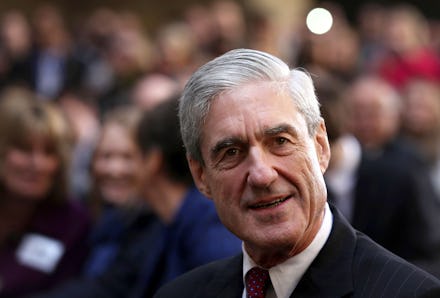On May 29, FBI special counsel Robert Mueller made his first address to the American public since he took over the Russia investigation two years ago. During a rather dry nine-minute address from the briefing room at the Justice Department, Mueller made several key announcements about the findings of the investigation, and his own role as special counsel. Here are the key takeaways from his statement to the press.
Mueller announced that he will resign as special counsel and close the office.
Mueller told the press that he would be resigning from his role as special counsel, closing the office, and returning to private life. He also said that he would not be testifying in front of congress after he and his team delivered their 448-page report detailing the findings of their investigations to Attorney General William Barr in March.
"It's important the office's written work speaks for itself," Mueller said during the press conference. According to CNN, Barr was made aware of Mueller's retirement before it was announced to the press.
"Any testimony from this office would not go beyond our report. It contains our findings and analysis, and the reasons for the decisions we made," Mueller said. "We chose those words carefully, and the work speaks for itself. And the report is my testimony. I would not provide information beyond that which is already public in any appearance before Congress."
Mueller reiterated the special counsel's report did not exonerate President Trump from any crimes.
After Mueller delivered his report to Barr, Trump repeatedly stated that the investigation cleared him of any crime, writing that the findings were a "complete and total exoneration."
Immediately after Mueller's statement Wednesday, Trump again stated that "there was insufficient evidence and therefore, in our Country, a person is innocent. The case is closed!"
In his statement, Mueller reiterated that was not true to the findings of the report. Rather, Mueller said that the investigation "did not establish that members of the Trump campaign conspired or coordinated with the Russian government."
“If we had confidence after a thorough investigation of the facts that the president clearly did not commit obstruction of justice, we would so state,” Mueller said. “Based on the facts and the applicable legal standards, however, we are unable to reach that judgment.”
Mueller also pointed out that the Department of Justice could not bring criminal charges against a sitting president; the only option for such a situation to occur would have to be through congressional impeachment proceedings.
"We did not, however, make a determination as to whether the president did commit a crime. The introduction to the volume two of our report explains that decision," Mueller said. "It explains that under longstanding department policy, a president can not be charged with a federal crime while he is in office. That is unconstitutional."
This portion of Mueller's statement was viewed by many as a recommendation that Congress move forward with impeachment proceedings. Democratic presidential candidates Elizabeth Warren, Pete Buttigieg, Beto O'Rourke, Cory Booker, and Kamala Harris all referred to Mueller's statement, and the report from the investigation as grounds to begin impeachment proceedings.
Mueller said that their report did allege that Russia interfered with the 2016 presidential election.
Mueller did explain the indictments against the Russian government that alleged interference in the 2016 presidential election. The allegations detail that "Russian intelligence officers who were part of the Russian military launched a concerted attack on our political system."
Mueller ended his statement by underscoring the seriousness of the indictments made against the Russian government.
"There were multiple, systematic efforts to interfere in our election, and that allegation deserves the attention of every American," Mueller said.
Despite calls from Democrats for impeachment proceedings to begin, it is still unknown whether Congress will take Mueller's findings and his sole public statement as a referral for the impeachment of President Trump.
